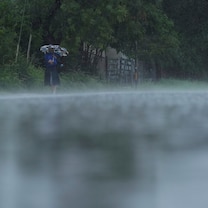Radio Station for Katrina Evacuees Stalled at Astrodome
Sept. 8, 2005 — -- Before it could even get on the air, the plug appears to be pulled on what might be called "Radio Free Katrina" -- a volunteer effort to create a tiny radio station for hurricane evacuees housed at the Astrodome.
The small, makeshift 30-watt radio station was to be broadcast under the name KAMP, or Katrina Aftermath Media Project, and was intended to provide vital information regarding schools, housing and finances to the thousands of evacuees now living in the Houston sports arena. Evacuees were also to be given opportunities to record short messages for broadcast in the hopes of reconnecting with friends and loved ones.
But county officials told KAMP organizers that limited electricity and potential problems getting access for the radio station's staff made the plan impossible.
"It's really unfortunate. We had Sony Corporation donating 10,000 radios, we had all the equipment to have it on air in the entire complex," said Rice University media professor Tish Stringer, who worked on the project. "I'm stunned, I'm disappointed."
They were prepared to begin building the station today, after receiving permission from the Federal Communications Commission, the mayor of Houston and the governor of Texas. But organizers received word late Wednesday that they were being denied their request to broadcast from inside the sports arena.
Stringer said her group was told by the Joint Operations Center at the Astrodome that officials could not provide the radio station with electricity. Organizers say they offered to use battery power for KAMP, but were still denied.
"We did not have the resources to accommodate them," said Gloria Roemer, communications director for the Harris County, Texas evacuee program at the Reliant Center which includes the Astrodome.
"One of their requests was unlimited access for their staff," said Roemer. "There's absolutely no way that we're going to give anyone unlimited access here."
While KAMP will not broadcast from the sports arena, organizers said they will continue to search for ways to use media to help hurricane victims.
"We are not done," said Hannah Sassman of Prometheus Radio, a nonprofit organization that supports local community radio efforts and helped coordinate KAMP. "We're going to keep trying … keep organizing around the radio community to develop content specifically geared around the population and people who have lost their homes."
The denial comes after a hectic week for volunteers working to organize KAMP.
Media activists from the Houston area say the idea for the Astrodome radio station came after they interviewed some of the thousands of Katrina evacuees living there, and were repeatedly told information wasn't being distributed to them.
Stringer felt a radio station could fill that void and started working on the project over Labor Day weekend as the Astrodome filled. She secured a donation from Sony Entertainment of 10,000 radios, which would have been distributed in the arena.
The station was to be run entirely by volunteers -- from producers and engineers to on-air announcers who would read vital information regarding the distribution of food, housing resources and schooling options. Stringer described the existing public address system in the Astrodome as loud and garbled.
Volunteers have also been walking through the Astrodome with video cameras to record personal stories from the inhabitants. Many endured several chaotic days at the New Orleans Superdome after Katrina struck. KAMP organizers planned to broadcast some of the responses on the radio station and stream the messages on the Internet to be broadcast in shelters in other cities
"People want to know how their loved ones are," said one volunteer, Harbeer Sandhu. "They seem to be totally in the dark and they want to be heard. They want to both hear of ways to connect to these services and tell these stories of how they've been let down by bureaucratic institutions."
Sandhu, who is 28 and self-employed, said he planned to spend at least a few hours a day at the station. He said he was among many students and media professionals interested in helping with KAMP. "We are all sort of taking time off from our other activities but we feel a really pressing need for a way that we can make a noticeable difference."





